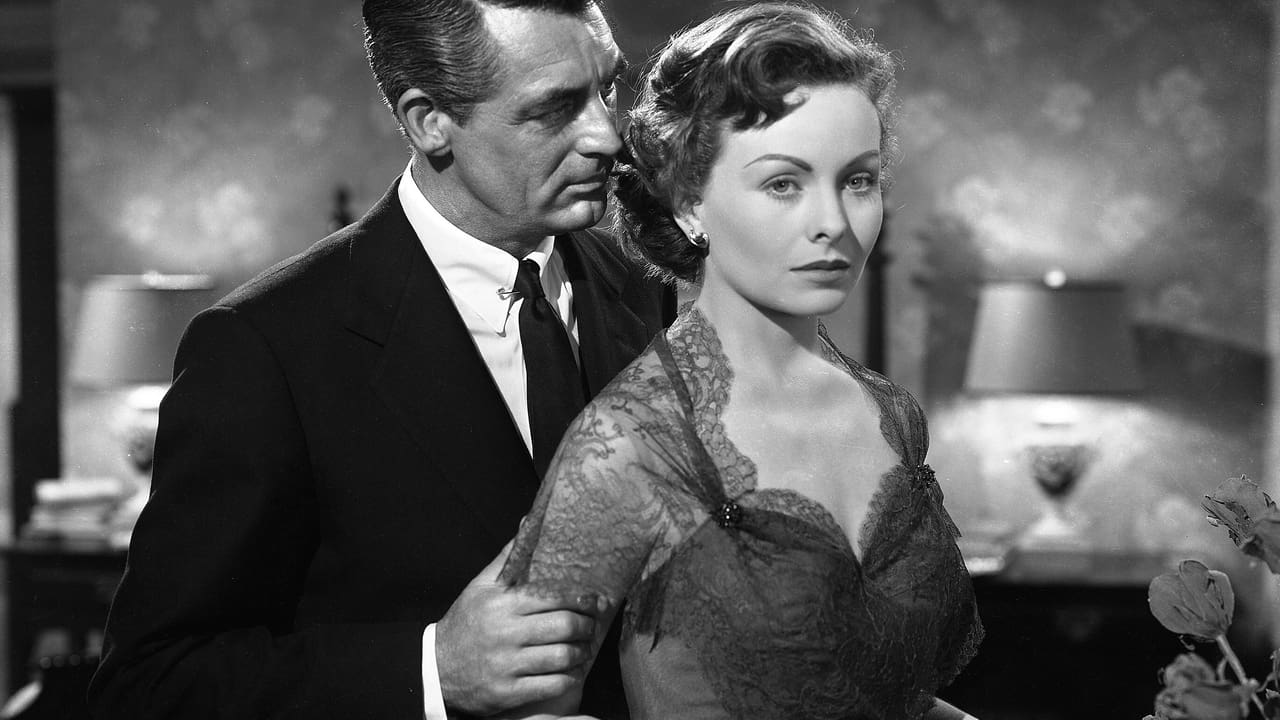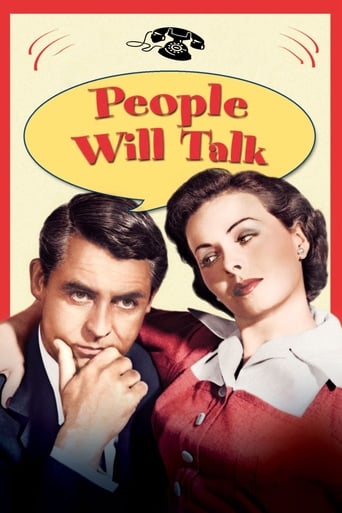



Well Deserved Praise
The movie turns out to be a little better than the average. Starting from a romantic formula often seen in the cinema, it ends in the most predictable (and somewhat bland) way.
View MoreAll of these films share one commonality, that being a kind of emotional center that humanizes a cast of monsters.
View MoreA film of deceptively outspoken contemporary relevance, this is cinema at its most alert, alarming and alive.
View MoreWhen I read the short description of this movie here, I got the impression it was going to be a nice, light, romantic comedy - as so many movies with Cary Grant in them. But I was terribly disappointed. This strange movie was not romantic at all, and not a bit fun either, but rather depressing and strange. Odd characters who are doing odd things out of odd motives, and having odd relationships with each other. The title "People will talk" is also misleading.I think Cary Grant, forever charming and incredibly handsome, was a waste in this one. I think he ought not to have lent himself to it - after-all, he was not exactly hard up for money at that point... Moreover, I think that Debra, his love interest in this movie, is an unpleasant character, both in looks and personality. Do not watch this movie - it is a waste of time and the opposite of feel good.
View MoreAn adaptation of the play ''Dr Praetorius'',PEOPLE WILL TALK is basically an excuse for writer-director Joseph Mankiewicz to show off his undoubted skill for dialogue and to make various points about political,moral and ethical hypocrisy.Mankiewicz achieves this all very well in general,though somewhat at the cost of actual cinematic quality.Dr Noah Praetorius (Cary Grant),an unorthodox but effective physician who teaches at a medical school,has a misconduct charge brought against him by a somewhat envious and pompous colleague,Professor Elwell (Hume Cronyn).He also falls in love with a young woman who occasionally attends the school (Jeanne Crain), who is expecting an out-of-wedlock child by a young man who has sadly died while serving in the Korean war,and Shunderson (Finlay Currie) a frequent and rather mysterious companion and associate of Praetorius, also arouses further suspicion.Made during the era of McCarthyism at it's height,Joseph Mankiewicz was no supporter of the relentless anti-communist campaign of the time,and intelligently if not too subtly makes this point (among various others) with Cary Grant declining to clear his own name by revealing details of his colleague Finlay Currie's private affairs (which prove to be very serious) during the medical hearing.Grant as usual is excellent and convincing in the lead role,veering from a cynical,highly educated medical professional to compassionate,sensitive,non-judgmental advocate to starry-eyed romantic.Jeanne Crain is effective too as his future bride scarred by unfortunate circumstance (the unmarried mother to-be hitching up with a man who isn't the father may have been a deliberate sop to the Production Code of the time),as is Walter Slezak as a supportive colleague, Hume Cronyn in his familiar guise as a prissy,unlikable,moralistic busy-body,and Finlay Currie as a former jailed convict with whom Grant took pity on after various personal tragedies (though his accent seems a curious hybrid of his native Scottish and half-hearted Irish and American).Grant's Praetorius is part of the academic and professional establishment but somehow wholly detached from it,rebelling against the various prejudices as what would be expected from his superiors towards hapless and lower status individuals like Crain and Currie who he befriends much to the chagrin of moral arbiters like Cronyn.These are liberal attitudes with a capital L,and Mankiewicz dramatises it all with great style with much literate,witty and thoughtful writing,taking critical potshots at the political and moral atmosphere of the time.The main problem with PEOPLE WILL TALK is as is suggested by the film's title.It is very apposite as the verbosity from virtually everyone (except from Currie until near the end of the film) sometimes becomes rather wearisome and taxing,and although Mankiewicz was undeniably a great writer,he was by no means as impressive a director,with the film's original theatre origins becoming obvious through mostly flat,uninspired,static handling and slow pacing.Still,despite the dialogue-heavy (or maybe because of it) script, PEOPLE WILL TALK is an entertaining piece about an unconventional and rebellious hero from the academia, and made in a period when such characters were easily dismissed from such lofty positions for daring to show such insubordination (as many actors,writers,directors,etc. from Hollywood were in this period).RATING:7 out of 10.
View MoreNo need to repeat the plot, which is pretty convoluted, anyway. Clearly this oddball piece of work is a message movie and a reflection of its time. It's also highly uneven, at times bordering on the ludicrous, yet gutsy too, with moments of genuine charm. Note that studio honcho Zanuck himself produced, perhaps signaling that the controversial anti-McCarthy subtext carried clear studio approval.That opening scene with Hamilton and Cronyn is a little comedic gem, but more importantly also serves to raise a major theme—namely, that rules should not be blindly followed. This turns out to be Praetorious' (Grant) main gripe with the medical profession and we get variations for the movie's remainder. I'm just sorry the rest of the film couldn't make its points in similarly entertaining fashion as this opening scene. Yes, there are other charming bits—Grant's back-and-forth with the cranky Slezak, or the toy train sequence.But too much of the film is given over to inflated dialog that's pompously stilted and painful to listen to. Is this how writer Mankiewicz really believes academics talk, in perfectly formed sentences that go on and on. Even such a winning personality as Grant is transformed by these clunky dialog demands. At the same time, there's no need to repeat the often poorly staged, ludicrous plot developments that other reviewers have cataloged (especially the awkwardly conceived barn scene with Grant and Crain).However, keep in mind what was happening in the country at that time, circa 1951. A veil of political and cultural conformity was descending, driven by the war in Korea and the McCarthy hearings it fueled. Difference was regarded with suspicion. In short, it took some guts to critique conformity in any of America's main institutions (here the medical establishment) or celebrate pompous iconoclasm (Grant) or intelligent failures (Blackmer) or convicted criminals (Currie) or academic eccentrics (Slezak). And on the feminine side, it took nerve to present the problems of compromised motherhood (Crain) or a bare female back (supposedly a cadaver's). Yet, the film's clear direction is toward challenging the conservatism of the day. But it's also a measure of the movie's unevenness that the villains (Cronyn and Wright) come off as strictly one-dimensional, easy targets.I expect the expert Grant was brought in to make the whole thing go down easier. Nonetheless, the overall result amounts to an awkward hybrid of subtext and comedy, rather daring and offbeat for its time, but now too sour and strange for even that endlessly triumphal final scene to overcome.
View MoreWhile the title suggests a Doris Day-Rock Hudson comedy, TALK is actually a drama interlaced with bits of humor about a doctor (Grant) whose unusual bedside manner stirs the ire of a fellow doctor (Cronyn at his weasely best). This leads to some problems for the good doctor, who goes by the moniker of Praeorius (now, where have we heard that name before?). The good doctor, who it turns out has quite a colorful past, runs a clinic, treating mostly female patients. In time, he falls for one of them, a troubled young woman played by Jeanne Crain. They eventually marry and the rest of the plot then quickly unfolds. Oh, the good doctor also conducts symphony orchestras in his spare time. The movie is deeply rooted in the conservative, uptight 1950s, although the emotions and motivations of various characters are just as relevant today. The debonair Grant keeps things moving swiftly along, and is aided and abetted by the wonderful Walter Slezak as his best buddy and most ardent supporter. The film is a historic curiosity at best, based on an old German play. Recommended for hardcore film buffs only
View More